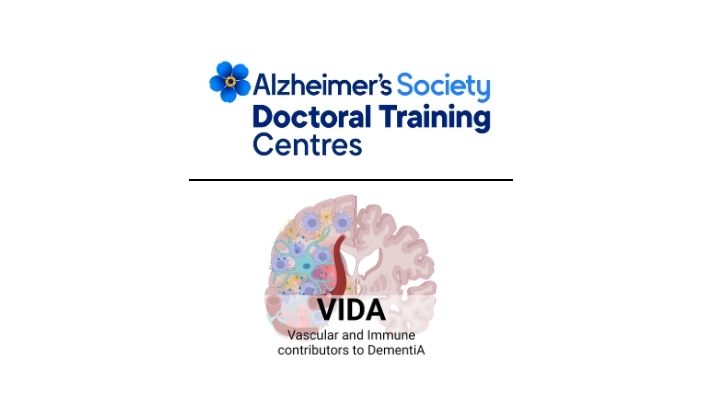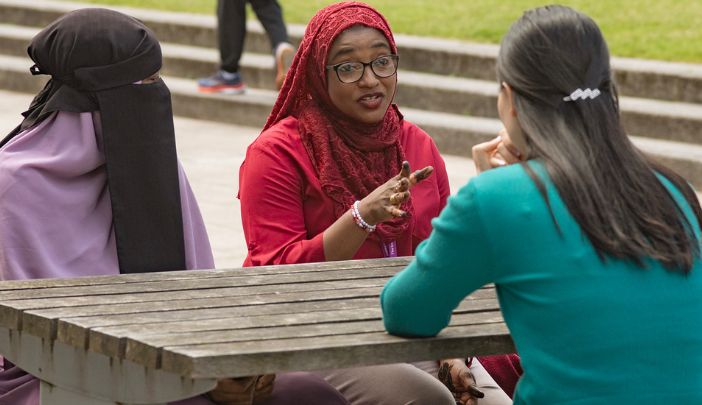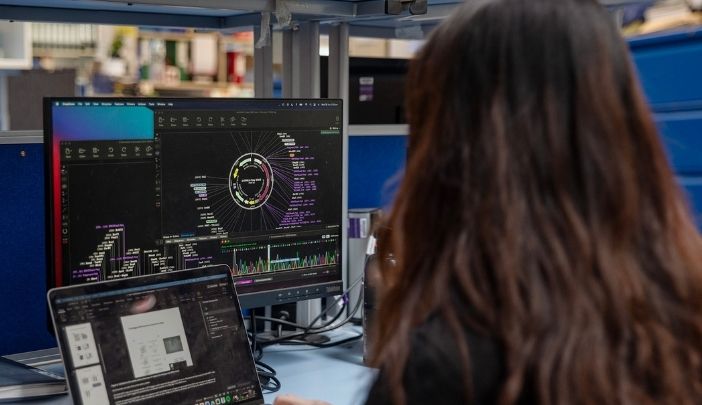Become part of the next generation of dementia researchers
Fully funded PhD opportunities in Alzheimer's research
The Alzheimer's Society Doctoral Training Centre for Vascular and Immune Contributors to Dementia (VIDA) is a multi-institutional partnership including The University of Manchester funded by the Alzheimer's Society.
The programme supports the next generation of dementia researchers with fully funded PhDs to understand the vascular and immune contributors to dementia.
On this page:
Vascular and Immune Contributors to Dementia (VIDA)
Commencing in 2025, the Alzheimer's Society VIDA DTC will train 29 PhD students over eight years with researchers using cutting-edge science to understand the mechanisms behind how dementia develops, to find new treatments and new approaches that will ultimately improve the lives of those affected by dementia.
All researchers will have supervisors from at least two of the institutions that make up VIDA: The University of Manchester, the University of Edinburgh, Imperial College London, and St George’s University of London.

About the programme
Funding
These PhD opportunities are open to UK nationals and will cover UK tuition fees, a tax free stipend per year at the Alzheimer's Society set rate starting at £21,800 for 2026/27, and £5,000 per year for research expenses/consumable plus £500 per year for travel to conferences.

Cohort
Join a cohort of PhD students at Manchester and collaborate with researchers at other institutes across the UK throughout the programme including an induction week at the beginning of the programme, annual conferences, and residential workshop retreats.
.jpg)
Opportunities
Participate in public engagement activities with the Alzheimer’s Society and their Research Volunteers Network, and benefit from a placement opportunity with an industry partner during third year and the chance to supervise a placement student to develop teaching and leadership skills.
.jpg)
Projects
Discover an Alzheimer’s Society VIDA DTC project you're passionate about.
Applications for 2026/27 entry are now closed.
Visit our projects page to browse all currently live projects from across the Faculty of Biology, Medicine and Health.
Eligibility
Competition for this programme is expected to be very high.
These studentships available to home and international applicants.
We require applicants to hold, or be about to obtain a minimum Upper Second class UK honours degree, or the equivalent qualifications gained outside the UK, in a relevant subject area for entry to this funded PhD programme. As this is a highly competitive programme, many of our applicants also hold a Masters-level qualification.
Applications are welcome from all backgrounds. We actively encourage applications from a diverse range of backgrounds. We seek to create equality of opportunity for all our applicants and postgraduate researchers.
Equality, diversity and inclusion
We welcome applications from all backgrounds and seek to create equality of opportunity for all our applicants and postgraduate researchers. See our Equality, Diversity and Inclusion statement for more information.

How to apply
Step-by-step guide to applying
Applications for 2026/27 entry are now closed.
To make an application for our Alzheimer's Doctoral Training Centre follow the step-by-step guide below.
You can apply for up to two projects in your single online application and all relevant supporting documents - including your supporting statement - must be submitted prior to the application deadline.
Further information on applying can be found on our How to apply page.
Ensure you meet the entry requirements for this programme and check you have the skills and characteristics we’re looking for in our postgraduate researchers on our ‘Eligibility and entry requirements’ page.
Browse our Alzheimer’s Society VIDA DTC projects once they're live. Discover one you're passionate about which matches your interests, ambitions and goals.
Found a project you're interested in? Contacting your potential supervisor and speaking to them about their project is your next step and is one of the most important things you need to do before you apply.
Before you complete your application you'll need to prepare the following supporting documents:
- Supporting statement;
- Reference details;
- Degree certificates and final/interim transcripts (If you are currently enrolled in a Master's programme and do not yet have an interim transcript, please provide alternative proof of enrolment, such as an offer letter);
- Official English language certificates (if applicable);
- Curriculum Vitae (CV).
A research statement is not required for this programme.
All supporting documents must be uploaded as part of the formal online application. Applications submitted without the required documentation will be considered incomplete and will not be processed.
Found a project and contacted the listed supervisor?
Apply via our application portal using the following details:
- Level of Study: select 'Postgraduate Research'
- Entry year: 2026/27
- Supervisor: Specify the name of the main supervisor only, if the supervisor isn’t listed you can enter it manually
- Intake: 'September'
For the funding sources section you should include:
- Funding: Select 'Yes' from the drop-down
- Type of Funding: 'Uni of Manchester scheme'
- Awarding Body: VIDA DTC
- Status of Funding: Awarded
- Funding covers: Fully Funded
Leave the remaining boxes blank
Further information on completing an application can be found on our How to apply page.
We will contact you if we wish to invite you to one of our interview days following supervisor nominations.
If you are invited to one of our interview days, you will be notified by email. If you are not nominated by a supervisor for a panel interview, we will notify you that your application has been unsuccessful.
Interviews take place remotely on Teams and will consist of a panel of up to three academic staff from across the University.
You will need to give a short presentation (not exceeding 10 minutes) on the project you are interested in. Presentations can be made in PowerPoint format or verbally.
After the interview the recruitment committee will assess candidates based on the interview, their CV, academic record and references.
Key dates
Dates for 2026 entry
- Projects announced: 21 November 2025
- Applications open: 21 November 2025
- Applications close: 9 January 2026
- Interviews take place: Week commencing 9 March 2026
- Studentships awarded: TBC
- Studentship begins: October 2026
Applications must be submitted by the deadline. Late and incomplete applications will not be considered.

Keep up-to-date
Sign up for updates
Be the first to hear about funded programmes and funding opportunities when they launch.
You’ll receive our monthly newsletter for prospective applicants which includes updates on featured projects, our latest events and application tips.

Contact us
Have any questions? Get in touch.
If you have a question about our Alzheimer's Society Doctoral Training Centre, please email our Doctoral Academy Admissions team:
Email: fbmh.doctoralacademy.admissions@manchester.ac.uk
See more contact information.

